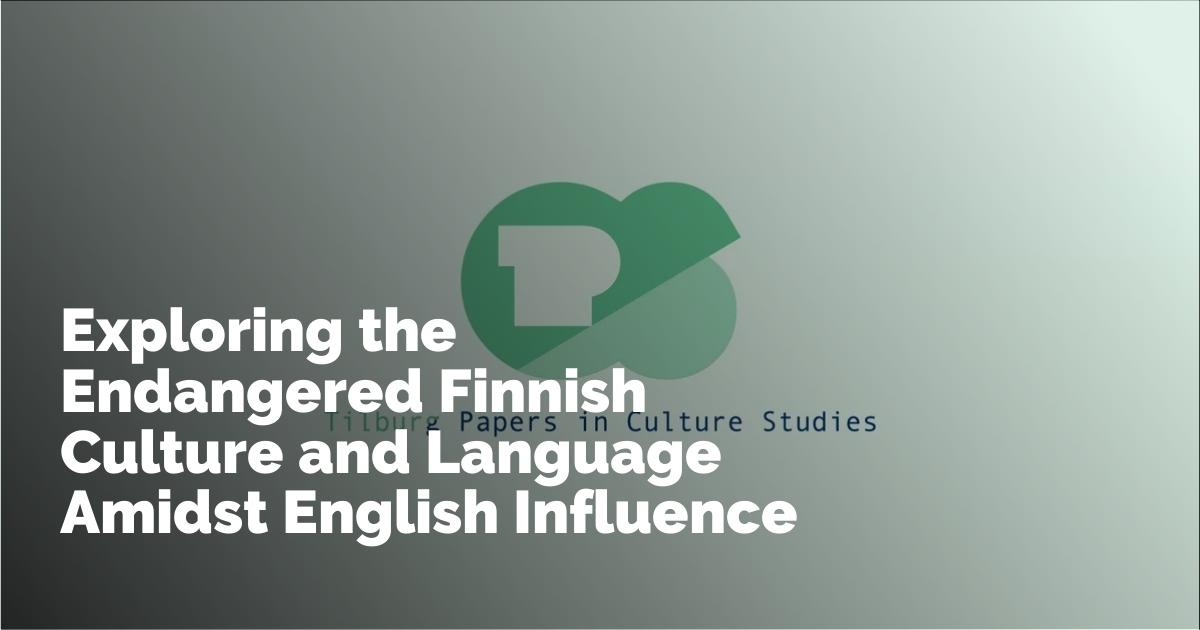Finnish Language and Culture Under Siege: Ideological Debates on English Influence
Introduction to Language Ideological Debates in Finland
In Finland, the discussion surrounding foreign languages often incites passionate public debates. Among these, the prominence of the English language stands out. This linguistic focus has been driven by a widespread apprehension manifested in the Finnish press, where English is frequently perceived as a menace capable of disrupting the sanctity of the Finnish language and culture. At the core of these concerns lies a deeply entrenched belief in the sanctity of national languages as fundamental to shaping the nation-state and determining national and cultural identity.
English as a Threat to National Identity
Examining the portrayal of English as a formidable threat, there emerges a discourse emphasizing the hierarchical valuation of languages in Finland, with English often occupying a contentious position. Public discourses on platforms such as newspapers—representing an influential societal forum—reveal that sentiments towards English are laced with anxiety about its possible deleterious effects on Finnish culture and language. Through a detailed exploration of newspapers from 1995 to 2007, key themes and recurrent topics emerge, underscoring a pervasive fear that English might erode national identity, culture, and even the psyche of Finnish individuals.
The Societal Role of English in Finland from 1995 to 2007
The period from the mid-1990s to the late 2000s was pivotal for Finland, marked by political, economic, cultural, and linguistic transformations—most notably, Finland's accession to the European Union in 1995. This event symbolized a significant turning point in Finland’s identity and political stance, fostering a new alignment with Western Europe. During this time, the spread of globalization further entrenched English in key societal sectors such as education, media, and everyday life. These developments fueled the debate over the increasing use and perceived significance of English in Finland, framing it as a potential antagonist to Finnish linguistic traditions.
Analyzing Finnish Press: Voices of Authority and Public Concerns
The analysis of Finnish newspaper editorials and public letters reveals distinct voices reflective of the societal and ideological anxieties. Editorials, providing the authoritative voice of newspapers like Helsingin Sanomat, echo institutional perspectives on foreign language influence, while letters-to-the-editor offer insights into the public’s concerns, revealing a nuanced tapestry of opinions on the matter.
Purity and National Integrity: Recurring Patterns in Debates
Recurring patterns in the debates spotlight the theme of purity, with foreign languages depicted as threats to the integrity of national language and culture. This narrative underscores a larger fear regarding the end of traditional nationhood and the advent of late modernity, where the preservation of cultural identity becomes a contentious issue.
The Lingering Effects of Globalization on Finnish Society
The discourse often extends beyond mere linguistic concerns, intersecting with broader global trends. The infiltration of English language elements in Finnish society is seen as part and parcel of cultural and political globalization—phenomena that signal a shift towards increased interconnectivity and the fluidity of cultural boundaries. As English permeates the societal fabric, it challenges long-standing perceptions of cultural homogeneity and national purity, pushing Finns to reevaluate their cultural identities.
The Finnish Cultural and Linguistic Identity at a Crossroads
As Finland continues to embrace English in various aspects of life, the ongoing debate serves as a critical reflection of the cultural shifts within the nation. The tension between maintaining linguistic purity and adapting to global linguistic trends encapsulates the broader struggle of defining national identity in a world increasingly driven by interconnectedness and cultural exchange.
Conclusion: Navigating Late Modernity’s Challenges
Ultimately, the debates encapsulated in Finnish media highlight a broader societal negotiation regarding cultural identity in the face of globalization and linguistic change. As Finnish society grapples with these challenges, it becomes essential to recognize the role language plays in shaping cultural identity and to harness the potential benefits of multilingualism amidst concerns of cultural preservation. Through understanding and navigating these linguistic and cultural dynamics, Finns can foster a more inclusive national identity that embraces both tradition and modernity.
출처 : Original Source

